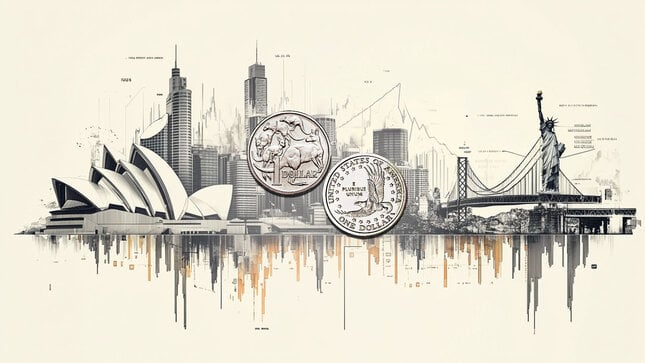- EUR/GBP climbs to around 0.8380 in Thursday’s early European session.
- The ECB is widely expected to cut the interest rates, bringing the bank's benchmark deposit rate to 2.5% on Thursday.
- BoE’s Ramsden said the central bank should keep a “careful and gradual” approach to monetary policy amid uncertainty.
The EUR/GBP cross trades in positive territory for the fourth consecutive day around 0.8380 during the early European session on Thursday. The easing fear of trade tariff plans from US President Donald Trump provides some support to the Euro (EUR). The European Central Bank (ECB) interest rate decision will take center stage later on Thursday.
The US announced the launch of tariffs on major trading partners, which are expected to cause a slowdown in global sectors, including automotive, but the duties might yet be pared back. Traders will closely monitor the developments surrounding further tariff plans. Any signs of escalating trade tensions could exert some selling pressure on the shared currency.
The ECB is expected to cut interest rates at its March meeting on Thursday. Markets have priced in a quarter-point rate cut from the ECB on Thursday and another half-point in cuts by the end of the year. Analysts at Rabobank said the EUR’s upside was “in part due to expectations that room for further ECB rate cuts will be more confined,” with the reforms and higher spending bringing the “promise of an uplift in economic growth.”
The Bank of England (BoE) governor Andrew Bailey thinks a renewed bout of inflation is nothing to worry about. Meanwhile, BoE Deputy Governor Dave Ramsden said that the UK central bank should keep a “careful and gradual” approach to the monetary policy amid uncertainty over the labor market and global trade. The bets of a gradual monetary expansion approach are supported by elevated United Kingdom (UK) wage growth, which could keep inflationary pressures persistently higher.
Euro FAQs
The Euro is the currency for the 19 European Union countries that belong to the Eurozone. It is the second most heavily traded currency in the world behind the US Dollar. In 2022, it accounted for 31% of all foreign exchange transactions, with an average daily turnover of over $2.2 trillion a day. EUR/USD is the most heavily traded currency pair in the world, accounting for an estimated 30% off all transactions, followed by EUR/JPY (4%), EUR/GBP (3%) and EUR/AUD (2%).
The European Central Bank (ECB) in Frankfurt, Germany, is the reserve bank for the Eurozone. The ECB sets interest rates and manages monetary policy. The ECB’s primary mandate is to maintain price stability, which means either controlling inflation or stimulating growth. Its primary tool is the raising or lowering of interest rates. Relatively high interest rates – or the expectation of higher rates – will usually benefit the Euro and vice versa. The ECB Governing Council makes monetary policy decisions at meetings held eight times a year. Decisions are made by heads of the Eurozone national banks and six permanent members, including the President of the ECB, Christine Lagarde.
Eurozone inflation data, measured by the Harmonized Index of Consumer Prices (HICP), is an important econometric for the Euro. If inflation rises more than expected, especially if above the ECB’s 2% target, it obliges the ECB to raise interest rates to bring it back under control. Relatively high interest rates compared to its counterparts will usually benefit the Euro, as it makes the region more attractive as a place for global investors to park their money.
Data releases gauge the health of the economy and can impact on the Euro. Indicators such as GDP, Manufacturing and Services PMIs, employment, and consumer sentiment surveys can all influence the direction of the single currency. A strong economy is good for the Euro. Not only does it attract more foreign investment but it may encourage the ECB to put up interest rates, which will directly strengthen the Euro. Otherwise, if economic data is weak, the Euro is likely to fall. Economic data for the four largest economies in the euro area (Germany, France, Italy and Spain) are especially significant, as they account for 75% of the Eurozone’s economy.
Another significant data release for the Euro is the Trade Balance. This indicator measures the difference between what a country earns from its exports and what it spends on imports over a given period. If a country produces highly sought after exports then its currency will gain in value purely from the extra demand created from foreign buyers seeking to purchase these goods. Therefore, a positive net Trade Balance strengthens a currency and vice versa for a negative balance.
Information on these pages contains forward-looking statements that involve risks and uncertainties. Markets and instruments profiled on this page are for informational purposes only and should not in any way come across as a recommendation to buy or sell in these assets. You should do your own thorough research before making any investment decisions. FXStreet does not in any way guarantee that this information is free from mistakes, errors, or material misstatements. It also does not guarantee that this information is of a timely nature. Investing in Open Markets involves a great deal of risk, including the loss of all or a portion of your investment, as well as emotional distress. All risks, losses and costs associated with investing, including total loss of principal, are your responsibility. The views and opinions expressed in this article are those of the authors and do not necessarily reflect the official policy or position of FXStreet nor its advertisers. The author will not be held responsible for information that is found at the end of links posted on this page.
If not otherwise explicitly mentioned in the body of the article, at the time of writing, the author has no position in any stock mentioned in this article and no business relationship with any company mentioned. The author has not received compensation for writing this article, other than from FXStreet.
FXStreet and the author do not provide personalized recommendations. The author makes no representations as to the accuracy, completeness, or suitability of this information. FXStreet and the author will not be liable for any errors, omissions or any losses, injuries or damages arising from this information and its display or use. Errors and omissions excepted.
The author and FXStreet are not registered investment advisors and nothing in this article is intended to be investment advice.
Recommended content
Editors’ Picks

AUD/USD holds the bounce near 0.6400 amid signs of easing US-China trade tensions
AUD/USD attracts some dip-buyers to hold near 0.6400 in the Asian session on Wednesday. Hopes for a possible de-escalation in the US-China trade war boost investors' appetite for riskier assets and support the Aussie. Further, the pause in the US Dollar rebound also aids the pair's upside.

USD/JPY regains 142.00 as US Dollar finds its feet
USD/JPY has picked up fresh bids to regain 142.00, reversing the dip to near 141.50 in the Asian session on Wednesday. Signs of easing US-China trade tensions led to a sharp recovery in the risk sentiment, lifting the US Dollar broadly despite doubts over Trump's veracity.

Gold price is down but not out ahead of US PMI data
Gold price is heading back toward $3,400, stalling Tuesday's correction from the $3,500 mark, The US Dollar recovery fixxles, allowing Gold price to regain footing as investors remain wary about US President Trump's intentions. Trump said on Tuesday that he hopes for US-China trade war de-escalation and doesnt intend to fire Fed's Powell.

Why is the crypto market up today?
Bitcoin rallied above $93,000 on Tuesday alongside the broader financial market following Treasury Secretary Scott Bessent's statement at a closed-door meeting that the trade feud between the US and China is unsustainable.

Five fundamentals for the week: Traders confront the trade war, important surveys, key Fed speech Premium
Will the US strike a trade deal with Japan? That would be positive progress. However, recent developments are not that positive, and there's only one certainty: headlines will dominate markets. Fresh US economic data is also of interest.

The Best brokers to trade EUR/USD
SPONSORED Discover the top brokers for trading EUR/USD in 2025. Our list features brokers with competitive spreads, fast execution, and powerful platforms. Whether you're a beginner or an expert, find the right partner to navigate the dynamic Forex market.



